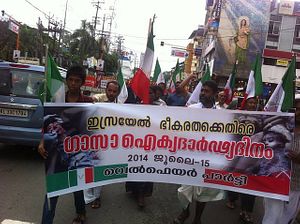As the world gets used to the pictures and news of Israel shelling schools in Gaza, Tel Aviv’s callousness, and its prime minister, Benjamin Netanyahu’s method of utilizing troops and missiles in an area 40 km long and 7 km wide (home to more than a million people), is being seen as incomprehensible for these modern times.
In India, the latest round of Israel’s heavy-handedness in Gaza has met with both significant public and political interest. However, the cases of both Israel and Palestine have managed to find equal representation in Indian discourse, making the current crisis a hotly debated topic not just politically, but publicly, especially on social media.
Before the campaign in Gaza by the Israel Defense Forces (IDF) intensified, the Indian parliament held a debate on the crisis following calls from opposition parties, particularly the Indian Left Front, which has traditionally stood vehemently against Israel. This stance in Indian politics is countered by the Bharatiya Janata Party (BJP) that is now in power, which has stood for closer ties with Tel Aviv, as did the previous UPA government led by the Congress party. This BJP view is backed by the nationalist leanings of the party and its supporters, many of whom see Israel as the main victim of Islamist terrorism, and justify its actions in Gaza under the idea of “self-defense.” This viewpoint is not seen as unnatural, considering India itself has been the victim of Islamist and state-sponsored cross-border terrorism for decades.
However, at least on the political front, the fact that Indian parties have raised the issue with such passion has very little to do with the plight of Gaza itself. As India’s political history has shown, this crisis in the Middle East is seemingly a tool for India’s opposition parties to try and push the new BJP government into a corner and to find a topic, any topic, to criticize, specifically along communal lines given the new Prime Minister Narendra Modi’s history. The fact that leaders from other regional parties such as West Bengal based Trinamool Congress and Uttar Pradesh based Samajwadi Party created an uproar over the government’s non-commitment to condemn Israel suggests political opportunism, as the same parties remained silent over other recent regional situations in the Middle East in which hundreds of Muslims were massacred. This includes the fact that India indirectly provided diplomatic backing to the Assad regime, despite the fact that Assad used chemical weapons against his own people.
India has historically maintained a view leaning more toward the cause of Palestine, and this was only strengthened by New Delhi voting against Tel Aviv at the UNHRC some days ago. This move again gained criticism from certain parts of media and intellectual circles, which criticized the government for continuing to follow the UPA government’s strategies of vote-bank politics at home. However, considering the fact that the new government has not made any major domestic policy shifts yet, expecting them to start with foreign policy was perhaps naïve.
Considering this, there is no doubt that India is looking to build closer ties with Israel, largely based on its strategic and security interests, and this outreach to Tel Aviv has spanned several governments since the countries established diplomatic relations in 1992. However, Tel Aviv is aware of India’s nuanced stand on Palestine, which remains largely attached to domestic politics, and even though New Delhi voted against them, the Israelis are (at least publicly) wise enough to appreciate and ignore the vote.
For India, Israel offers an avenue to import technology crucial to further developing its domestic defense sector. Israel has quickly become a hub where Indian companies can gain access to technologies that are usually difficult to attain via other avenues in the West. This also provides India with another defense industry partner, thereby avoiding putting all its military procurement eggs in one basket. Tel Aviv has also previously been cautious concerning Indian military interests, with Israel assisting the Indian militarily in a small yet significant capacity during the 1971 war with Pakistan, and also becoming one of the few countries not to condemn its nuclear tests in 1998. Overall Israel has had a lot to offer India, while India has had little to reciprocate with. India’s challenges in regard to Israel were highlighted recently when the Ministry of External Affairs blocked ONGC Videsh’s bid for gas blocks in Israel’s Leviathan off-shore field, so as to not anger its Arab allies.
This time however, aside from the political discourse, the plight of Gaza and its people have also caught the attention of the Indian public. Unlike any conflict before this, including Syria or Iraq, Israel’s offensive in Gaza has managed to capture the attention of much of the Indian middle class. What is driving this sudden attention? Perhaps it is the visually traumatic media coverage and the potential ease of identifying the “good” from the “bad.” The Indian public is largely seeing the conflict in black and white, while missing out on vital nuances such as the role of Hamas (and Israel’s role in enabling Hamas in its earlier years), the historical role of mediators such as Egypt and the U.S., and other aspects.
As for why the Indian public discourse did not respond in such a manner to Syria, ISIS, Iraq or even the slowly renewing military capabilities of the Taliban in Afghanistan, the answer possibly lies in the fact that many unquestionably accept violence as part of the region, except this time Israel has managed to attract widespread condemnation.
Kabir Taneja is a journalist covering Indian foreign affairs and energy sector for The Sunday Guardian, The New York Times (India Ink), Tehelka, The Indian Republic and others. He is also a Scholar at The Takshashila Institution.

































